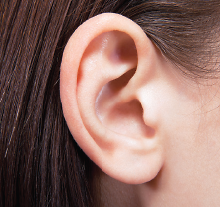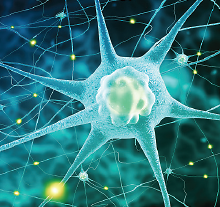Researchers Identify Link Between Serotonin, Tinnitus
Patients taking selective serotonin reuptake inhibitors (SSRIs) sometimes experience new or worsening tinnitus—the chronic perception of ringing or buzzing in the ears in the absence of any internal or external acoustic source. A study appearing in Cell Reports offers a cellular explanation for this relationship.
Researchers at Oregon Health and Science University used mouse models to demonstrate that serotonin can modulate sensory processing in a brain region known as the dorsal cochlear nucleus (DCN). The DCN is involved in integrating multiple types of sensory inputs.
The researchers observed that following exposure to serotonin, neurons in the DCN known as fusiform cells become less sensitive to inputs from auditory nerve fibers, but hypersensitive to inputs from other sensory fibers.
The authors speculated that changes in the DCN hypersensitivity may explain why some patients report that tinnitus is enhanced by movement of the head or jaw.
Maternal Insomnia Linked With Poor Sleep in Children
Children tend to sleep worse if their mothers experience insomnia, reports a study appearing in Sleep Medicine. There was no link between paternal insomnia and children’s sleep behaviors.
A total of 191 healthy children aged seven to 12 and their parents took part in this study, conducted by researchers at the University of Warwick and the University of Basel. The children underwent in-home electroencephalography (EEG) while sleeping, and parents reported on their child’s sleep habits using the Children’s Sleep Habits Questionnaire and the Insomnia Severity Index. According to the EEG analysis, maternal but not paternal insomnia symptoms were related to less total sleep time, later sleep onset time, and later awakening time in children.
Additionally, both mothers and fathers with sleep problems reported more frequently that their children had difficulties getting into bed and sleeping long enough.
“The findings show that children’s sleep has to be considered in the family context. In particular, the mother’s sleep appears to be important for how well school-aged children sleep,” senior author Sakari Lemola, M.D., said in a press release.
Spectroscopy May Identify Alzheimer’s From Blood Samples
To identify and begin treating neurodegenerative diseases as early as possible, most experts agree that accurate and noninvasive diagnostics are needed. A study in Proceedings of the National Academy of Sciences suggests a technique known as vibrational spectroscopy can identify early cases of Alzheimer’s disease from blood samples.
Rather than measure specific concentrations of one or a few molecules, vibrational spectroscopy takes a broad assessment of a blood sample’s composition to create a “spectral fingerprint.”
An international team of researchers assessed samples from 347 individuals with a neurodegenerative condition (including 164 Alzheimer’s patients) as well as 202 healthy, age-matched controls.
They found that vibrational spectroscopy could distinguish Alzheimer’s cases from controls with about 70 percent accuracy overall. When only looking at samples from people who had the ApoE4 risk gene, the accuracy increased to 86 percent.
The investigators also found they could use the technique to distinguish Alzheimer’s from other neurodegenerative disorders. In particular, Alzheimer’s and Lewy body dementia, which are clinically similar, could be distinguished with 90 percent accuracy.
Oxidation Is Key to Damage From Parkinson’s Disease
A group of researchers led by a team at Northwestern University has uncovered a toxic cascade of molecular events that leads to neuronal degeneration in people with Parkinson’s disease (PD).
The findings, published in Science, provide the first link between key pathological features of PD and point to a new target for future therapies to reduce the breakdown of neurons of patients with PD.
The researchers studied dopaminergic neurons derived from the stem cells of patients with PD. They observed that these neurons had defective mitochondria (the energy-generating components of a cell), which caused oxidized dopamine to accumulate. This oxidized dopamine, in turn, caused dysfunction in the lysosomes (the cell’s recycling machinery) and an accumulation of a protein named α-synuclein. When α-synuclein aggregates, it can become toxic (it is the primary component of Lewy bodies).
The study authors found that if they treated the neurons early on with antioxidants, this lysosomal damage could be prevented, which points to potential therapeutic interventions in humans.
Interestingly, cultured mouse neurons with mitochondria defects did not develop PD pathology until the researchers artificially elevated dopamine production in the cells.
“The inherent differences between human and mouse dopaminergic neuronal vulnerability emphasize the value of studies in human neurons to identify pathways and targets for therapeutic development in PD and related synucleinopathies,” the authors concluded.
CBD May Counter Psychiatric Effects of THC
Cannabidiol (CBD), a non-psychoactive component of cannabis, appears to protect against negative psychiatric effects of tetrahydrocannabinol (THC), according to an animal study published in Cannabis and Cannabinoid Research.
Researchers at Indiana University divided both adolescent and adult male mice into one of five treatment arms: three of the groups received injections of either 3 mg/kg THC, CBD, or both every day for three weeks. The fourth group received a placebo injection while the fifth remained undisturbed in their cages throughout the study. All mice were given a variety of behavioral tests at the end of the treatment period as well as six weeks later.
Both adult and adolescent mice exposed to THC alone showed signs of impaired memory and increased obsessive-compulsive behavior when tested after the three-week treatment. When reevaluated three weeks later, the adolescents continued to display these behaviors. Both groups also experienced a long-term increase in anxious behaviors.
In contrast, adult and adolescent mice exposed to CBD alone or CBD and THC showed no short- or long-term behavioral changes at the end of treatment or six weeks later.
“This study confirms in an animal model that high-THC cannabis use by adolescents may have long-lasting behavioral effects,” said lead author Ken Mackie, Ph.D., in a press release. “It also suggests that strains of cannabis with similar levels of CBD and THC would pose significantly less long-term risk due to CBD’s protective effect against THC.” ■





